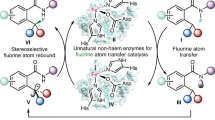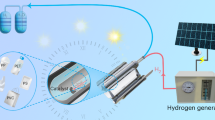Abstract
GLUCOSE oxidase (EC 1.1.3.4) is commonly found in the stagnant substratum of lignocellulose degrading fungi accompanying phenol oxidases, cellulases and glucosidases1–4, where the steady-state supply of available oxygen is undoubtedly very limited5. Yet oxidants other than oxygen have heretofore received little attention as potential co-substrates of this enzyme despite its poor affinity for oxygen4,6. Spectrophotometric studies reported here on the interaction of glucose oxidase with transitory quinone and free-radical lignol oxidation products demonstrate that these intermediates are capable of serving as co-substrates of the reduced flavoenzyme at low oxygen tensions. Evidence is presented which suggests that glucose oxidase operates in concert with laccase, the principal phenol oxidase of Polyporous versicolor3,7, a typical ‘white-rot’ fungus noted for its capacity to degrade lignin1,8–12, to maintain a laccase–glucose: quinone oxidoreductase cycle in the fungal substratum by which lignol substrates may become highly oxygenated and ultimately degraded.
This is a preview of subscription content, access via your institution
Access options
Subscribe to this journal
Receive 51 print issues and online access
$199.00 per year
only $3.90 per issue
Buy this article
- Purchase on Springer Link
- Instant access to full article PDF
Prices may be subject to local taxes which are calculated during checkout
Similar content being viewed by others
References
Higuchi, T. Adv. Enzym. 34, 207–277 (1971).
Ek, M. & Eriksson, K. Appl. Polym. Symp. 28, 197–203 (1975).
Fahraeus, G. & Reinhammer, B. Acta Chem. Scan. 21, 2367–2378 (1967).
Bentley, R. Enzymes 7, 567–586 (1963).
Finn, R. K. Bact. Rev. 18, 254–274 (1954).
Laser, H. Proc. R. Soc. 140, 230–243 (1952).
Fahraeus, G. & Tjunggreu, H. Biochim. Biophys. Acta. 46, 22–32 (1960).
Freudenberg, K. & Neish, C. A. Constitution and Biosynthesis of Lignin (eds Kunzeller, A., Springer, G. F. & Whitman, H.), 47–122 (Springer, New York, 1968).
Kirk, T. K. A. Rev. Phytopath. 9, 185–210 (1971).
Kirk, T. K. et al. Proc. natn. Acad. Sci. U.S.A. 72, 2155–2519 (1975).
Westermark, U. & Eriksson, K. Acta chem. Scand. B 28, 209–214 (1975).
Westermark, U. & Eriksson, K. Acta. chem. Scand. B 29, 419–424 (1975).
Mason, H. S. Adv. Enzym. 16, 105–184 (1955).
Nakamara, T. et al. Oxidases and Related Redox Systems 1, 311–334 (1964).
Keilen, D. & Hartree, E. F. Biochem. J. 42, 221–229 (1948).
Han, Y. W., Lee, J. S. & Anderson, A. W. Agri. Food Chem. 23, 928–931 (1975).
Lessler, M. A. & Brierley, G. P. Meth. Biochem. Anal. 17, 1–29 (1969).
Author information
Authors and Affiliations
Rights and permissions
About this article
Cite this article
GREEN, T. Significance of glucose oxidase in lignin degradation. Nature 268, 78–80 (1977). https://doi.org/10.1038/268078a0
Received:
Accepted:
Published:
Issue Date:
DOI: https://doi.org/10.1038/268078a0
This article is cited by
-
Laccases for biorefinery applications: a critical review on challenges and perspectives
Bioprocess and Biosystems Engineering (2015)
-
Decolourisation of mushroom farm wastewater by Pleurotus ostreatus
Biodegradation (2008)
-
Identification of glucose oxidase activity as the primary source of hydrogen peroxide production in ligninolytic cultures of Phanerochaete chrysosporium
Archives of Microbiology (1986)
-
Glucose-2-oxidase activity in mycelial cultures of basidiomycetes
Folia Microbiologica (1985)
-
Applied molecular biology: Lignin biodegradation becomes biochemistry
Nature (1983)
Comments
By submitting a comment you agree to abide by our Terms and Community Guidelines. If you find something abusive or that does not comply with our terms or guidelines please flag it as inappropriate.



